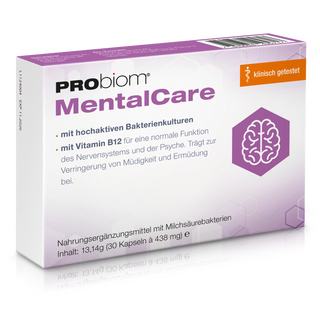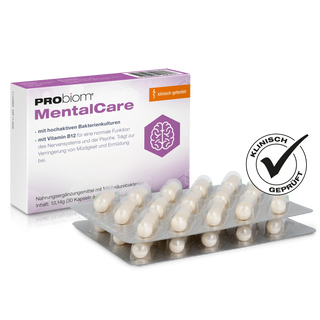The close connection between the gut and the brain is being increasingly researched and is gaining importance in medicine and neuroscience. The so-called gut-brain axis describes the bidirectional communication between the digestive system and the central nervous system. But how exactly does our gut influence our brain – and vice versa?
What is the gut-brain axis?
The gut-brain axis is a complex communication network consisting of various components:
- Nervous system : The vagus nerve, the main connection between the gut and the brain, transmits information in both directions.
- Immune system : The intestine is closely linked to the immune system, as about 70% of the immune cells are located there.
- Hormone system : Certain intestinal bacteria produce neurotransmitters such as serotonin, which influences our mood and emotions.
- Microbiome : The trillions of microorganisms in the gut play a central role in communication with the brain.
How does the gut influence the brain?
Gut health can have a direct impact on our mental and emotional state. Here are some mechanisms by which the gut microbiome influences the brain:
Production of neurotransmitters
- Serotonin, often referred to as the “happiness hormone,” is produced about 90% in the intestine.
- GABA, a calming neurotransmitter, can be regulated by certain intestinal bacteria.
Influence on stress and anxiety
- Studies show that an unbalanced intestinal flora is associated with increased stress and anxiety reactions.
- Probiotic bacteria can help regulate stress hormones such as cortisol.
Inflammation and its effects on the brain
- An unbalanced gut can trigger chronic inflammation, which is linked to depression and neurodegenerative diseases.
- A healthy intestinal flora helps to reduce inflammatory markers and thus protects the brain.
How does the brain influence the gut?
The brain also has a direct influence on the intestines:
- Stress can worsen digestive problems such as irritable bowel syndrome or stomach pain.
- Mental illnesses such as anxiety and depression are often associated with altered intestinal flora.
- Negative emotions can alter intestinal motility and lead to diarrhea or constipation.
How can you positively influence the gut-brain axis?
Probiotics and prebiotics
- Beneficial bacterial strains such as Lactobacillus and Bifidobacterium promote healthy intestinal flora.
- Prebiotic fiber (e.g. inulin, resistant starch) supports the growth of good intestinal bacteria.
Nutrition
- A gut-friendly diet with fermented foods (yogurt, sauerkraut, kimchi) can help.
- Omega-3 fatty acids have anti-inflammatory effects and promote brain function.
Stress management
- Relaxation techniques such as meditation, yoga and breathing exercises can reduce stress levels.
- Regular exercise supports both intestinal and mental health.
Healthy sleep
- Lack of sleep can negatively affect the microbiome and lead to mental exhaustion.
- A regular sleep routine promotes intestinal health.
Conclusion
The gut-brain axis impressively demonstrates how closely our physical and mental health are connected. A healthy gut can help reduce stress, improve mood, and enhance overall well-being. With the right diet, targeted probiotics, and a conscious lifestyle, everyone can positively influence the communication between the gut and brain.













